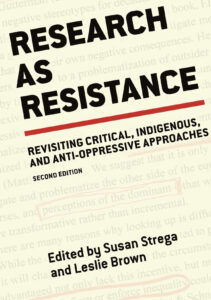Anti-Oppression Research
Applying Stakeholder Value Creation means providing opportunity for participant voice not only as “data” but also in terms of shared meaning making. The method itself, then, advances the intended change outcome of a shift in the dominant migration narrative to one that centres the human experience. This is an anti-oppressive research stance, where the “intention is that the actual process of the research becomes an intervention for change, rather than relying on changes coming through the research outcome or product” (Brown & Strega, 2015). In anti-oppressive research, relationships and their power dynamics are at the forefront. Researchers have the power to construct and legitimate certain ideas over others (El-Sadek, 2021). As Ceglowski (2000) explores, as cited in Brown & Strega, constant attention needs to be given to these relations and dynamics, and care must be “taken to try and shift the balance of knowledge-creating power from outside researchers to those with lived experience of the issue under study” (2015).

Recognising this power imbalance between researcher and researched, attending to these relationships (i.e. relational accountability) for me includes:
- Learning related context and history relevant to participants’ narrative
- Practicing cultural humility and ethno-relativity (which requires cultural self-awareness, awareness of my positionality, and nonjudgement)
- Inviting participation at multiple stages and in ways that feel appropriate to participants
- Accepting responsibility to repeatedly check my biases (for example using academic journaling and a flip-it-to-check-it method)
- Accepting the responsibility to advance justice based on the research findings (both within and beyond the scope of the defined project, and in concert with participants or other actors/collaborators as appropriate)
- “Researching up” to look at the dominant power systems and structures as related to the topic
References
Brown, L. A., & Strega, S. (2015). Research as resistance : revisiting critical, indigenous, and anti-oppressive approaches (Second). Canadian Scholars’ Press.
El-Sadek, L. (2021). International Research in Crisis Situations and Unprecedented Times of Uncertainty. In Y. Tolstikov-Mast, F. Bieri, and J.L. Walker (Eds.) Handbook of international and cross-cultural leadership research processes: Perspectives, practice, instruction. Routledge, 499-514.
